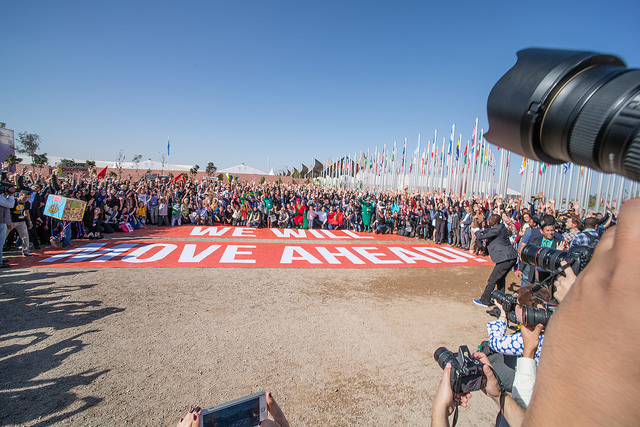Climate change will put an additional 70 million people at risk of hunger in 2050, IFPRI research suggests. It will be impossible to solve the global hunger problem without also addressing the climate problem through adaptation and mitigation.
Three IFPRI researchers—Mark Rosegrant, Keith Wiebe, and Alex De Pinto—took that message to the U.N. Conference of the Parties on Climate Change (COP22) in Marrakesh, Morocco Nov. 7-18, focusing on the theme “Africa, Adaptation, and Agriculture.”
Climate change increases pressure on natural resources and slows progress in reducing hunger, especially in Africa South of the Sahara, Wiebe said at an OCP Group side event, “Food Security and Climate Change: How to Build Sustainable and Resilient Food Systems.” Climate change impacts on crops can be partially offset by economic adjustments at the farm level and policy responses at the national level, Wiebe said. Because climate change magnifies existing problems, he added, simply using existing resources more efficiently can help.
“Agriculture is a major part of the climate problem—it currently generates 11 to 29 percent of total greenhouse gases emissions,” De Pinto told the audience at the same event. Climate-Smart Agriculture (CSA), he said, aims to make the agriculture sector better-suited to handle the challenges of a changing climate by sustainably increasing agricultural productivity; helping food systems adapt and building their resilience; and reducing GHG emissions.
Increasing farm productivity sustainably will require more efficient use of inputs and a likely reduction of emission intensity, De Pinto argued, and a CSA approach must involve all aspects of food production and development if it is to make a significant contribution. A transition to CSA will meet obstacles such as risk, uncertainty, and imperfect markets, De Pinto said, and decision-makers must take a systemic view of agricultural development in the overall context of land use.
Speaking at the FAO session “Coping with Water Scarcity in Agriculture: A Global Framework for Action in a Changing Climate,” Rosegrant emphasized that water is critical in the climate system, and in mediating the impacts of climate variability and change in all economic sectors. Water insecurity and risk are particularly high in tropical and monsoonal regions, he said. Rosegrant said that IFPRI can help meet these challenges by promoting better knowledge, good practices and available technologies, and innovation in places where it works around the world.
In another forum, “Coping with Climate Change in the MENA Region,” (sponsored by the International Center for Agricultural Research in Dry Areas and INRA Morocco) Rosegrant examined the role of agricultural policy in food and nutrition security for the Middle East and North Africa. Challenges for environmental sustainability there include depletion of groundwater and water pollution, he said, cautioning that though absolute hunger is not the big problem for the region, there are still many people at risk. Several policies can help guide the region as the world heats up, he said: accelerating investments in agricultural research and development; promoting complementary policies and investments; and economic reforms, including supporting open trading regimes to share climate risk.
Organizations seeking to build on COP22 should focus on implementing sustainable and resilient management of soils, water in agriculture, and climate risks, Rosegrant said. “Partnerships and networks need to be put in place and made effective,” he said. “The toughest part of this is making them effective, since interest can wane quickly. The energy level needs to be sustained when people leave.”
Katarlah Taylor is an Information and Knowledge Management Facilitator at IFPRI.







